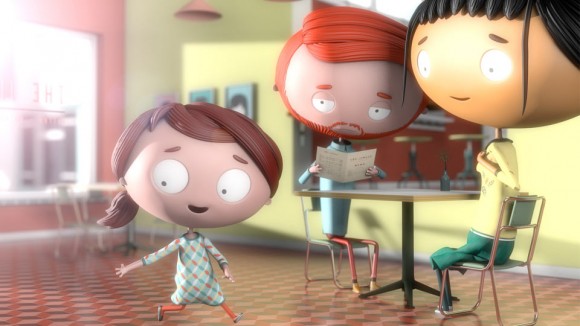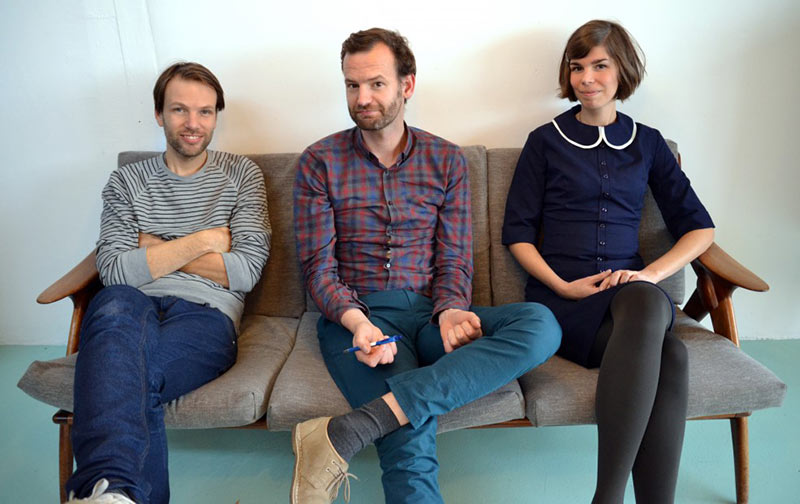

Job, Joris and Marieke Open Up About Life After An Oscar Nomination
Last winter, Job Roggeveen, Joris Oprins, and Marieke Blaauw gained overnight industry-wide fame after their animated short, A Single Life, was nominated for an Academy Award. Since then, the trio’s small Dutch animation firm Job, Joris & Marieke has been fielding interest from producers and ad agencies on both sides of the Atlantic.
Navigating the rush of post-Oscar interest from the entertainment world can be daunting for even experienced veterans, much less a trio of independent filmmakers from Utrecht in the Netherlands. But Job, Joris, and Marieke have adapted to the new realities of their status, and remain committed to developing their own voice while picking advertising jobs carefully. Their new short (Otto) premiered earlier this month at the Toronto International Film Festival. Clocking in at ten minutes, it’s almost three times the length of their Oscar-nominated effort.
Cartoon Brew sat down with Job, Joris, and Marieke in the Netherlands to talk about their Oscar experience, the growing pains of a tiny studio, their new short (Otto), and their upcoming plans.

Cartoon Brew: Was it a dream of yours to be nominated for an Oscar?
Joris: Sure, we would daydream about it, but it always felt like a cartoonesque daydream rather than a real possibility. Every time an e-mail arrived with “Oscars” in the subject header, we panicked, thinking, “That’s it! That’s the e-mail saying the Academy made a mistake and we are disqualified.”
Cartoon Brew: Did the nomination result in new collaborations or more commercial jobs?
Marieke: It got us many new international contacts, but it remains to be seen if it will actually result in something.
Job: Now that I think about it, we actually got less work because of the Oscars. For awhile after the ceremony, our studio phone kept suspiciously quiet. Perhaps clients were assuming we suddenly turned super expensive.
Marieke: I think the nomination did gain us a sense of trust with Dutch funding bodies and with bigger commissioners like the City of Utrecht, for whom we recently made its Tour de France promo, Bon Voyage. The nomination is like an external evidence of our capabilities.
Cartoon Brew: You went on a promotional tour through Los Angeles and San Francisco with Ron Diamond and your fellow nominees, visiting all the big animation studios. What made you decide to go, and what was it like?
Marieke: Soon after the nominees were announced, we received an e-mail from Ron. At first we were a bit suspicious of this guy named Ron Diamond; we assumed that was a stage name or something. Was he offering us a promotional tour for free? It just felt too good to be true. But after brief consideration, we decided to jump at the opportunity, and I’m so glad we did. It turned out to be a fantastic experience.
We were looking forward to touring the big studios, but we weren’t sure what we would gain from the whole experience. The studios that we were going to visit are so big already; what could they need from a small studio like us? Looking back now, I found it very insightful to have lunch with and talk to the animation professionals there, and to get to know our fellow nominees.
Cartoon Brew: What surprised you most during your promotional tour?
Marieke: The studios we toured are so much bigger than we had imagined. They really are corporations, huge well-oiled machines with specialists for every detail of the process. It felt like even animating eyes is a specialty, so to speak. It was funny to realize that some animators at the big studios actually envied us a bit, instead of the other way around. It’s awesome to be able to say you were part of this or that big blockbuster movie, but it’s also really awesome to be able to say a film is fully yours. It made us appreciate our personal work more than we already did.
Cartoon Brew: Did your experiences in America influence your future plans for your studio?
Job: What it meant to be a big animation studio was something we didn’t understand until we actually went on those studio visits. Now we are even more convinced in our desire not to grow much bigger than we are. Big studios are constantly busy with keeping the business running, so that employees can do the creative work, while as a small studio we can be creatively involved in everything we do. I’d rather be part of something relatively small and unimportant, but feel important within that, than feel unimportant in something big and important.
Marieke: We want to keep our team as small as possible. The bigger the team, the more you lose control as a director. Something gets lost, like with that whispering game children do. The smaller the team, the easier it is to maintain the essence of the whole.
Cartoon Brew: Despite feeling a bit reluctant to grow as a studio, you did start bringing in other people onto your projects. What do you find to be the positive and negative sides to this development?
Job: We’re very much aware of the fact that if we want to make longer films, we’ll have to let more people in. It’s not easy though, because we have been working together with just the three of us for so long. Our studio feels like our personal living room, so when someone else is here it feels like we have a visitor that we need to care for. There’s a different dynamic.
Marieke: We’re learning to direct people, which I find very difficult. On the other hand, it wasn’t always easy to direct ourselves. Overall, it has been a very positive experience working with new people. For our latest film, we hired the talented animator, Rik Schutte, and modeler, Eric Smilde. They really upped the film’s level of quality, which is great, although sometimes also a bit painful for our egos.
Job: In the end, what’s great about a bigger team is that we get so much more stuff done in the same period of time. We don’t want to have a big crew permanently though. We want to be able to grow and shrink as a studio.
Cartoon Brew: In between films, you’ve created an installation called “Freeze!” Can you tell us about that?
Marieke: There was an exhibit in the Netherlands about the art of animation, and we were asked to create an installation in one of the its spaces. We wanted to explain how frames work in animation. We thought about making a zoetrope, but we’ve seen that so many times before and we we wanted to do something else. In the end, we 3D-printed the frames of an animated character coming into existence on paper and ending up in a glass case.
Job: We thought it would be easy to 3D-print the animation, but it wasn’t. Some frames took 30 hours to print, and often things would go wrong. Several times, an arm would break and we’d try to support the broken arm with our hands to allow the 3D printer to finish the frames. While on holiday, we installed a webcam so we could check when something went wrong and stop the machine. It was worth all the trouble though; it was great to see our characters get out of the computer and into the real world.
Cartoon Brew: How do you estimate your chances at getting nominated again for an Oscar with your new short Otto?
Joris: Before, we never thought being nominated was possible, being a small studio with little budget. But with A Single Life’s nomination, we realized we can stand beside a studio like Disney, even with a small budget. It’s not about how much money is behind the film or how technically perfect, it’s about good ideas.
Job: If we get nominated again, I think last year’s nomination will be an advantage. More Academy members know us and our characters now, so there’s a greater chance that they will take note of (Otto). Personally, I think (Otto) demonstrates more craft than A Single Life. There’s more drama, and the story is more extensive. Our previous films were short, small concepts. Our characters used to have a purpose only in that particular story. In (Otto), you really feel for the characters; they’re bigger than the story of the film.
Marieke: With A Single Life, we had no expectations at all; now we do. We’re spoiled. Getting nominated for (Otto) now feels like a possibility, although realistically speaking it’s just as impossible as it was with A Single Life. There are so many films in the running.
Cartoon Brew: A Single Life was two minutes long. (Otto) is 10 minutes, and your next short will be 25 minutes. What comes after?
Job: We have a concept for a feature-length movie that’s not for meant kids. It’s a weird concept, in line with our previous films. We’re facing some exciting new challenges thinking about the design and the characters for this movie. After all, the audience should be willing to spend 90 minutes with those characters. Mary and Max serve as a great inspiration; it’s very emotional with little means.
Marieke: We haven’t written a treatment yet; first we have to finish our 25-minute short. We try to learn from this process as much as possible, so we can use the skills we gain from this project for the feature-length movie. We’ve been thinking about this movie for some years already, but the Oscars experience made us even more passionate about actually doing feature-length film. Before that, it felt totally out of our league. But now with the nomination and the U.S. tour, we’ve grown so much that we’re finally daring to express our wish to direct a feature film.
Cartoon Brew: Your upcoming project will mark your fourth animated short in four years. What does that say about your time-management skills?
Job: We often ask ourselves the same question. We take deadlines very seriously; we have never missed a single one. I guess it’s because our studio is a well-oiled machine. We do have discussions, but we have a common vocabulary when it comes to films and visual language. Also, we decide on everything in the development phase, so when it’s finally time to go into production all of our creative questions have been answered already.
Marieke: I think we’re very good at making the right decisions under pressure. Our attitude towards decisions is practical; if we have to decide now, we do it. If you have too much time available, then you’ll take it, but that doesn’t mean you’ll make better decisions. Actually, I think A Single Life would have been less of a film if we would have had more time. We had to make it in a few months and since it wasn’t allowed to be longer than two minutes, that forced us to make the film’s story and timing dense. Restrictions often lead to creative solutions.

.png)